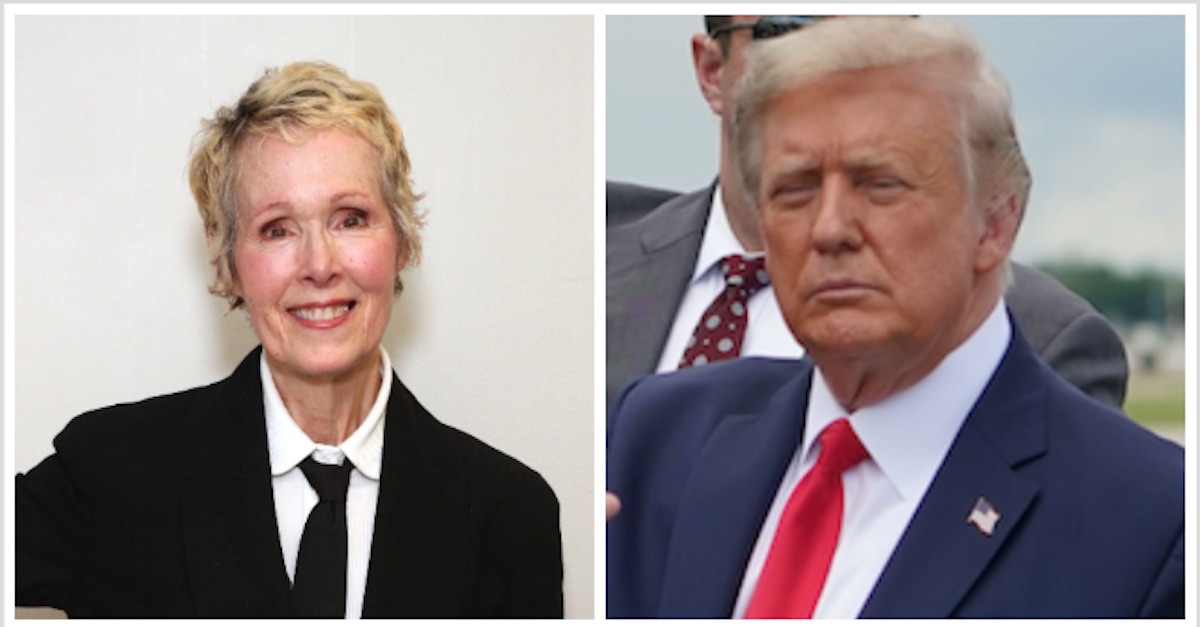
Former President Donald Trump’s lawyers asked a federal judge on Tuesday to allow him to amend his answer to rape accuser E. Jean Carroll’s complaint in order to file a countersuit.
Skewering the ex-president’s lawyers during oral arguments stretching roughly an hour, the judge appeared inclined to reject that effort.
“Why isn’t amendment futile?” Senior U.S. District Judge Lewis Kaplan asked Trump’s lawyer Alina Habba at one point, leaving little doubt at the end of his questioning that he believed that it was.
Toward the end of the Trump presidency, Carroll filed a lawsuit, initially in state court, claiming that the then-president defamed her by falsely denying that he raped her in the dressing room of the department store Bergdorf Goodman in the 1990s, but for the better part of its life, proceedings have revolved less around her allegations than whether the case caption should even be Carroll v. Trump. The case went to federal court after the Department of Justice intervened.
In late 2020, Judge Kaplan rejected an effort by then-Attorney General Bill Barr’s Justice Department to transform the case into Carroll v. United States. The Justice Department claimed that Trump was acting in his presidential capacity when he answered the accusation of sexual assault by telling reporters: “She’s not my type.”
To the surprise of many, Attorney General Merrick Garland’s Justice Department adopted the same position. The Second Circuit is currently reviewing the government’s position that it should replace Trump in the litigation.
Judge Kaplan refused to pause the litigation until the appellate court supplied its answer, leaving Trump as the defendant as the hearing began on Tuesday.
Habba, fresh from a legal defeat in her bid to block New York Attorney General Letitia James’s (D) subpoenas, faced another uphill battle in trying to launch a counteroffensive against Carroll.
Though Habba wanted to press counterclaims under New York anti-SLAPP law—a statute designed to punish lawsuits aimed at stifling political speech—Judge Kaplan appeared skeptical those state claims would fly in federal court.
When Habba cited a couple of precedents in her support, Kaplan interjected: “How many said no?”
“It’s a lot,” the judge answered.
At one point during the hearing, Habba asserted that proceedings were delayed because Trump was a sitting president. Kaplan scoffed at that assertion.
“You can’t litigate when you’re a sitting president,” the judge repeated her position, incredulously. “Are you kidding?”
Kaplan punctuated one of his points to Habba by stating “as anyone who went to law school would know” and even critiqued the New Jersey-based attorney’s rapid-fire style of delivery.
“If you spoke any faster, it would be simply a blur,” Kaplan told Habba.
Kaplan noted that if Trump were allowed to amend his answer to press counterclaims under state anti-SLAPP law and Carroll prevails, Trump could owe her attorney fees.
Habba said that she “absolutely” understood that.
“If that is what happens, that is what happens,” Habba said.
Carroll’s lawyer Roberta Kaplan called it “more than a little ironic” that the party that brought the case to federal court has complained about alleged “forum shopping.” Kaplan also noted that Trump has criticized the watershed First Amendment precedent of New York Times v. Sullivan, which held that those who sue public figures for defamation must show actual malice. One of the most important rulings for press freedom in the United States, the precedent also imposes a high bar to successfully sue any litigant for defamation in cases involving public figures, not only ones involving a reporter or news organization.
As the parties resolve procedural issues, Kaplan emphasized that her team obtain Trump’s DNA to test whether it matches the genetic material that she says was left on her dress at the time of the alleged incident.
“We’d like to get this case going, and we think that discovery should happen,” Roberta Kaplan said.
Judge Kaplan reserved ruling on the motion.
[Images via Astrid Stawiarz/Getty Images for Glamour, MANDEL NGAN/AFP via Getty Images]